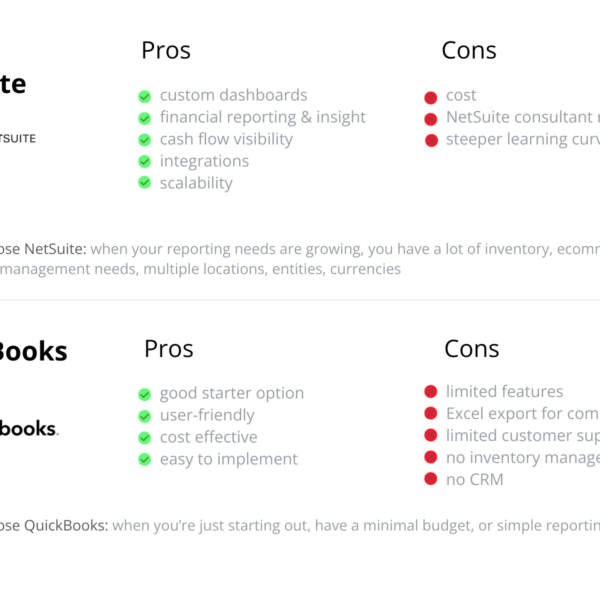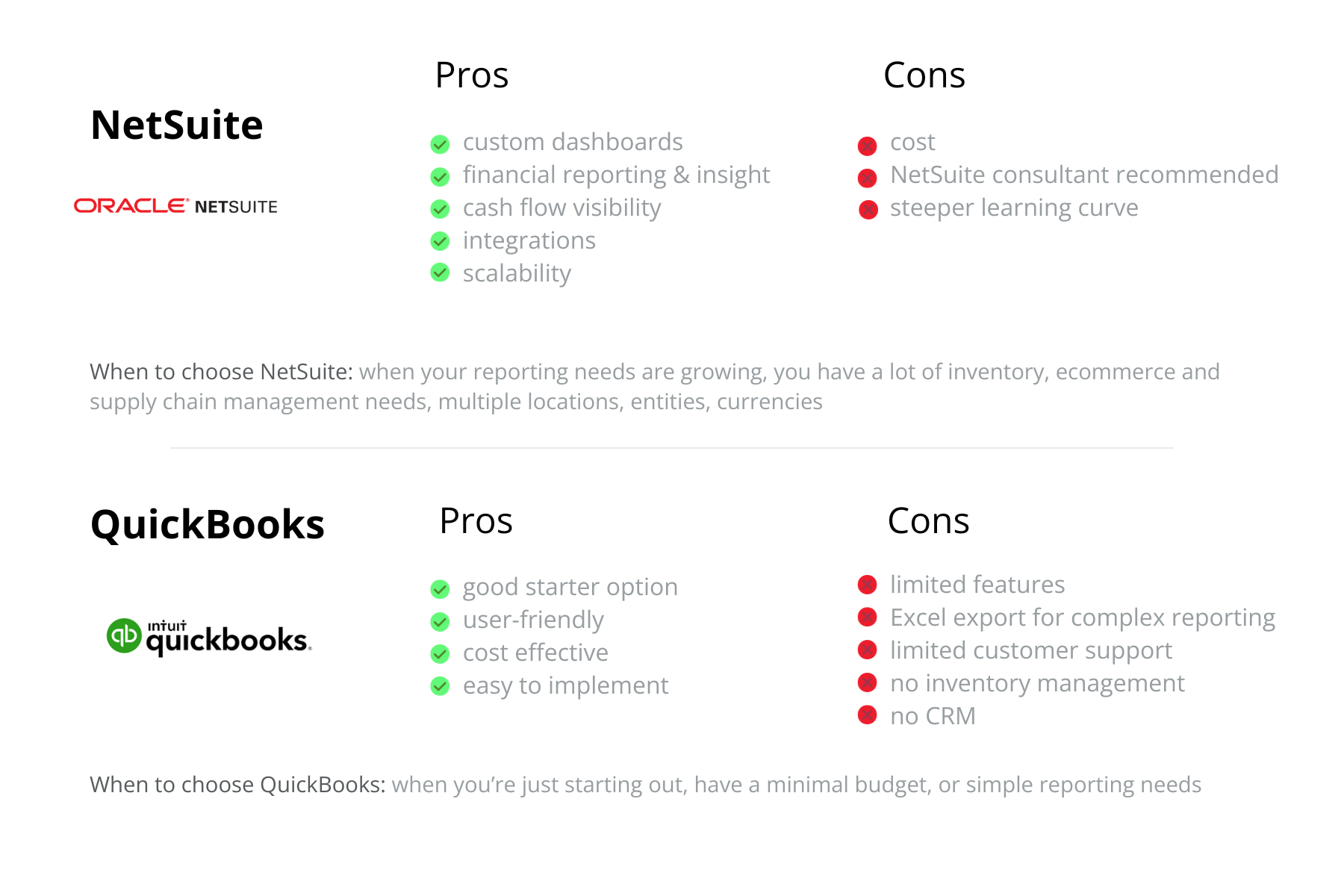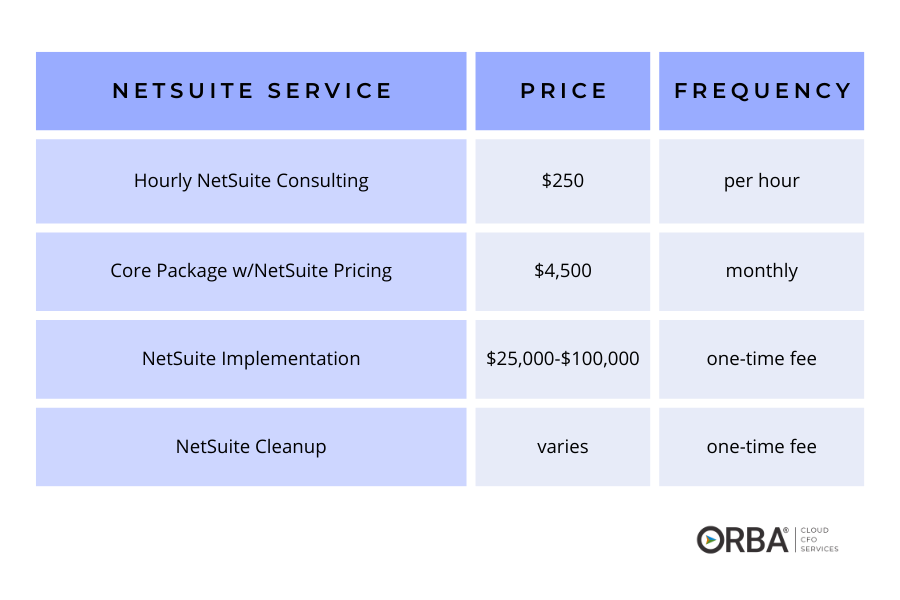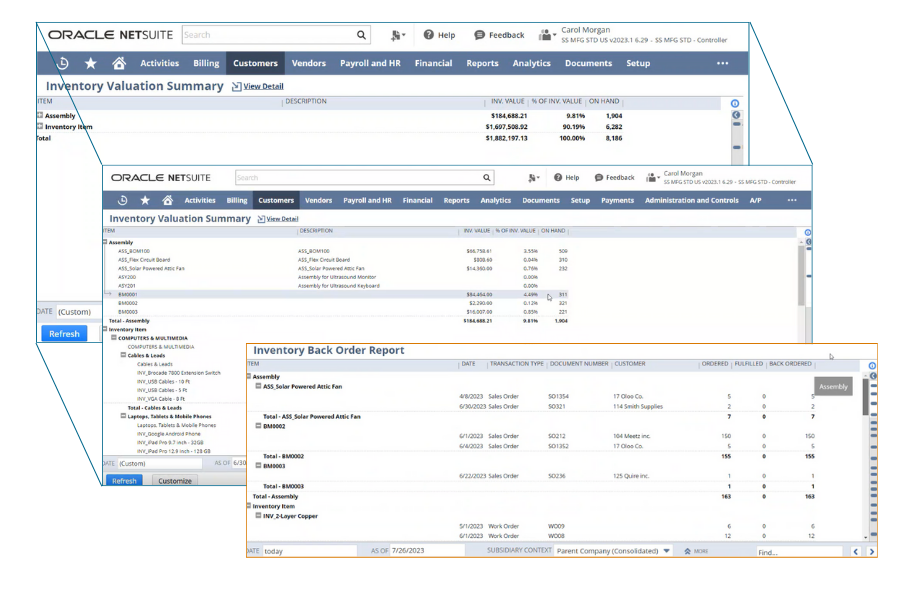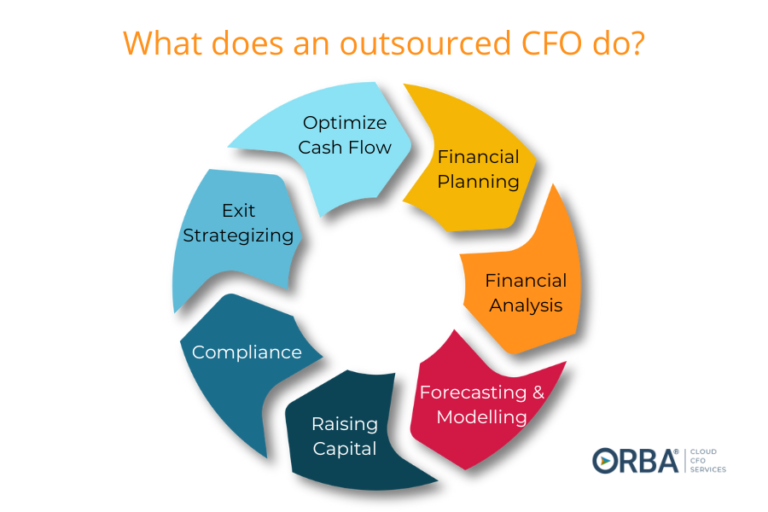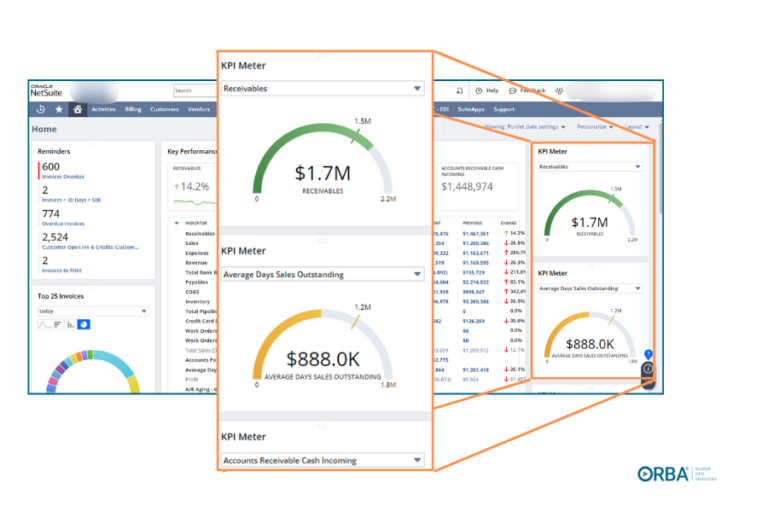What’s the difference between NetSuite vs. QuickBooks?
For small business owners, having the right accounting software can make all the difference in managing finances and staying on top of business operations. Two popular options in the market are NetSuite and QuickBooks, both known for their powerful tools and user-friendly interfaces. But which one is better suited for your small business? Let’s dive into our side-by-side comparison of NetSuite vs. QuickBooks to find out.
QuickBooks vs. NetSuite Cost
Of course, one of the first questions is always what does QuickBooks vs. NetSuite cost?
QuickBooks Cost
QuickBooks generally has a lower monthly cost starting as low as $12 per month. This, of course, makes it an affordable option if you’re on a tight budget.
It wouldn’t take very much to need the advanced package however, and if you’re not already considering it, you’re probably not yet at a stage of growth to consider NetSuite. We still use QuickBooks Online with many of our smaller clients, and would recommend it to any business still in the bootstrapping stage.
As soon as you move into increasing user access, payroll per employee, and merchant fees, you start seeing your price per month creep up north of $200 per month. And if you’re looking at QuickBooks Enterprise, you’re looking at closer to $500+ per month. But at this point we begin recommending you make the switch to NetSuite.
NetSuite Cost
On the other hand, NetSuite’s pricing is more tailored to the specific needs and size of a business, making it more expensive than QuickBooks. A very basic NetSuite accounting plan can start around $1,000 per month plus user access fees of $99/user, but it can replace other software tools and streamline many aspects of your operations. You’ll need to speak to a salesperson in order to get a custom NetSuite price quote.
Learn more about our NetSuite Pricing
Cloud CFO Tip: Choosing a NetSuite BPO partner can help you find better licensing offers.
NetSuite offers advanced features and customization options that may be worth the investment for larger businesses with complex accounting needs. We would also recommend hiring a NetSuite accountant to get the most out of the ERP, especially for the initial ERP implementation and migration to NetSuite. So, if you’re not in a place to do that, you’re probably not yet ready for NetSuite.
Client Case Example: One of our manufacturing clients that makes around $5 million in revenue per year pays around $3k per month for NetSuite plus our NetSuite accounting fee on a monthly and as-needed hourly basis. While it may seem like a lot for a small business, they no longer have to log sales and export reporting to Excel. Plus, everyone who needs it has access to real-time insight from customized dashboards. They can make same-day business decisions based on the demand planning and fulfillment tools that NetSuite offers.
If your finance needs have grown too complex for QuickBooks, it may be time to get NetSuite.
Signs it’s time to switch might include:
- Too much time exporting from QuickBooks into Excel to get more insightful reporting
- Heavy inventory needs
- Multiple entities and a need for consolidated reporting
- Multiple currencies
Our Cloud CFO caveat here is that while NetSuite is more expensive, for a lot of our clients, they extract way more value from NetSuite than the difference in cost comparing NetSuite vs. QuickBooks.
QuickBooks Cost
- starts at $12 per month
- most SMB users spending $200+ per month
NetSuite Cost
- starts at $1000 per month
- add a user access fee of $99/user
- expect to need an implementation consultant or NetSuite accountant
Winner: QuickBooks
NetSuite vs. QuickBooks: Features and Functionality
While both NetSuite and QuickBooks offer basic accounting features such as invoicing, expense tracking, and financial reporting, NetSuite goes a step further by offering advanced features such as project management, inventory management, and CRM.
QuickBooks Features
- invoicing
- expense tracking
- financial reporting
- some dashboards
NetSuite Features
- invoicing
- expense tracking
- financial reporting
- project management
- inventory management
- CRM
- custom dashboards and views
Watch: NetSuite Dashboard Customization
Check out this video to see how easy it is to customize the NetSuite dashboard:
With better automation and custom options, this makes NetSuite a more comprehensive solution for businesses looking to streamline their operations and handle all aspects of their business in one platform. QuickBooks, on the other hand, is better suited for smaller businesses with simpler accounting needs.
Winner: NetSuite
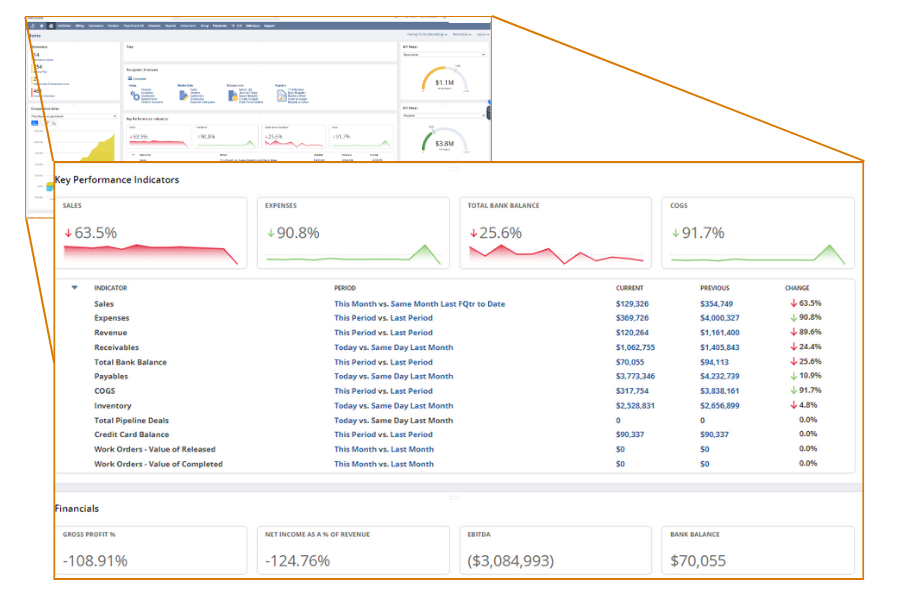
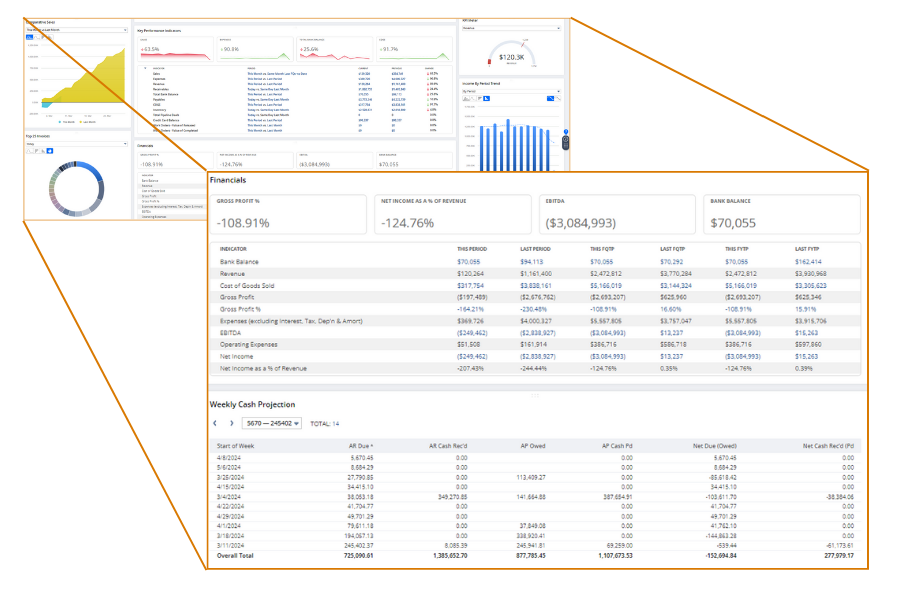
User Experience
NetSuite and QuickBooks have intuitive interfaces that are easy to navigate, making it simple for users to get started without much training.
QuickBooks UX
- user-friendly interface
- shorter learning curve
NetSuite UX
- user-friendly interface
- more complex to learn
NetSuite may require some time to fully grasp its capabilities. In our experience it can take a year before someone is really comfortable with the features they need within their role. After that however, you’ll wonder how you ever survived with only QBO. Better yet, you may need to hire a NetSuite consultant to maximize its capabilities and your investment. Use this NetSuite implementation guide to get a handle on how to get the best ROI. This could be a deciding factor for small business owners who don’t have the luxury of spending too much time learning a new software.
Winner: QuickBooks
Integration and Scalability
NetSuite vs. QuickBooks Integrations
As businesses grow, their accounting needs also become more complex. In this aspect, NetSuite has an advantage over QuickBooks as it offers seamless integration with other business applications and can easily scale to accommodate growing accounting needs. We typically recommend our clients use Celigo to connect their integrated solutions to NetSuite. QuickBooks, on the other hand, may struggle with scalability and integration due to its limitations in features and customization options.
A few of the tools you can expect to integrate with NetSuite using Celigo include:
- Shopify
- WooCommerce
- BigCommerce
- SPS Commerce
- Amazon
- eBay
- Walmart
- RF-SMART
- FarApp
- 3PL
- ADP
- EasyShip
- Freshdesk
- Zendesk
- HubSpot
- SalesForce
- Microsoft Dynamics
- SCS Cloud
Case Study: Young Nails uses NetSuite integrations to grow revenue 29% YoY for two years
QuickBooks does sync with a number of other tools, but if you have any need to track supply chain KPIs or a need for eCommerce integrations like BigCommerce, 3PL, EDI, or RF-SMART to name a few, you’re better off going with NetSuite.
Winner: NetSuite
Support and Customer Service
NetSuite vs. QuickBooks Customer Service
When it comes to customer support, both NetSuite and QuickBooks offer reliable service with various channels of communication such as phone, email, and live chat. However, NetSuite’s dedicated account managers and personalized onboarding process give it an edge over QuickBooks in terms of support for complex accounting needs.
QuickBooks Support
- Phone
- Live Chat
NetSuite Support
- Phone
- Live Chat
- Dedicated account managers
- Custom onboarding
Winner: NetSuite
NetSuite vs. QuickBooks Pros and Cons
Here are the key takeaways from our NetSuite vs. QuickBooks comparison:
When to use NetSuite vs. QuickBooks?
Probably the number one challenge we see growing businesses running into with QuickBooks is limited reporting. So often, as you grow, business owners need more out of their reporting in order to make complex (and the right!) business decisions. And who wants to reinvent the wheel each day in Excel. The need to slice and dice data and pivot from one day to the next is an important functionality that you can’t truly accomplish using QuickBooks.
When to choose QuickBooks?
- Just starting out
- Small budget
- Simple reporting needs
When to choose NetSuite?
- Flexible and customized reporting needs
- Multiple-subsidiaries, multi-locations or are expanding internationally
- Need a CRM integrated with your accounting software
- Need integrated payroll and HR needs
- Supply chain management needs including inventory demand planning and fulfilment
- Working with too many systems
NetSuite vs. QuickBooks: And the winner is…
As you can see in this NetSuite vs. QuickBooks showdown, it can really depend on your needs whether NetSuite or QuickBooks is the better choice. Overall we would guide clients toward NetSuite if they have any interest in scaling up. Plus, with the added benefits of our NetSuite accountants our clients see an average revenue growth of 47%!
